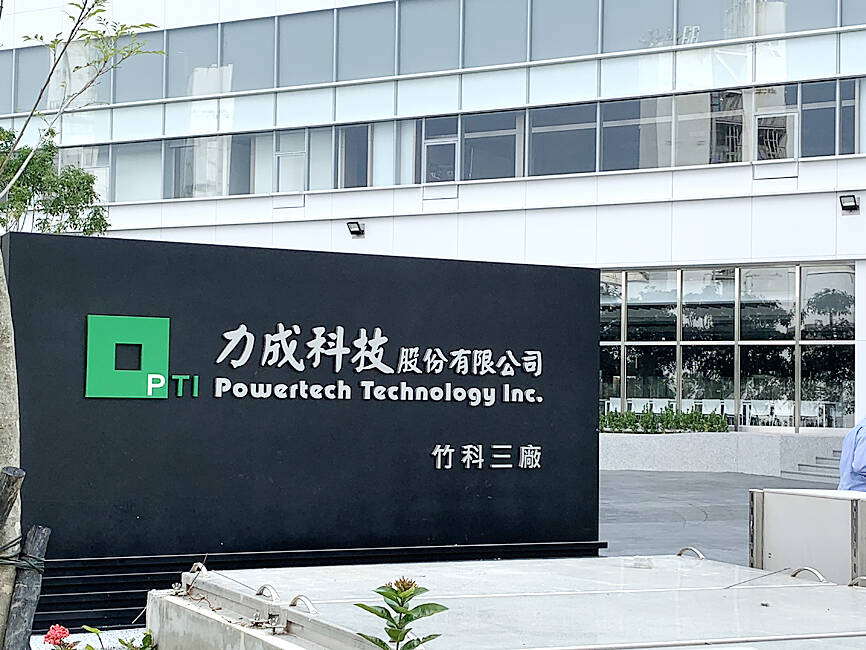Powertech Technology Inc (力成科技) yesterday reported that net profit last quarter plunged 49 percent year-on-year due to a longer-than-expected inventory correction cycle, but that it expects business to recover later in the year.
Net income fell to NT$1.13 billion (US$36.8 million) from NT$2.2 billion a year earlier and slid 16.5 percent from NT$1.35 billion in the previous quarter, the chip testing and packaging service provider said.
Gross margin declined to 16.1 percent last quarter from 22 percent a year earlier and 17.2 percent in the prior quarter, it added.

Photo: Grace Hung, Taipei Times
“The inventory adjustment lasted longer than we expected,” Powertech chairman Tsai Du-kung (蔡篤恭) told investors.
“We thought the inventory adjustment cycle would end soon, but it was dragged down by a slower-than-expected recovery in the Chinese market and political factors,” he added.
The memorychip industry was hit hard because of its overreliance on the Chinese market, Tsai said.
However, capacity reductions by the world’s major memory chipmakers, including Samsung Electronics Co and SK Hynix Inc, should have a positive effect on the industry, he added.
Demand remains fragile this quarter, although there were sporadic signs of a pickup in the TV, Wi-Fi and networking segments, the company said.
Powertech retained its forecast that revenue would increase at a quarterly pace for the remainder of this year.
The automotive and industrial segments have been growing over the past quarters and would continue to expand this quarter, it said.
To cope with rising demand for those applications, Powertech is expanding capacity in Japan through its subsidiaries Tera Probe Inc and TeraPower Technology Inc.
“The second quarter would be better than the first quarter,” Powertech chief executive officer Boris Hsieh (謝永達) said. “The first quarter would be the trough as we expected.”
The company expects to benefit from the rising popularity of ChatGPT, as demand for servers to support artificial intelligence applications would increase and lead to growth in memory chip demand, Hsieh said.
Powertech said it has proposed a new issue of up to 75.9 million shares to fund potential merger-and-acquisition (M&A) deals abroad, as customers urge the company to diversify its manufacturing sites amid rising tensions between Taiwan and China.
“We believe it would be feasible to purchase an older plant overseas to align with customers’ ‘Taiwan+’ supply chain strategy. It is extremely difficult and not financially viable to build an overseas fab that is capable of offering advanced technologies like those in Taiwan,” Tsai said.
Powertech does not have any M&A targets at the moment, he said.
The company said it plans to raise its cash dividend payout ratio next year as it has abundant cash on hand at NT$18.49 billion and a lower debt ratio of 41 percent, Tsai said.
Powertech has proposed distributing a cash dividend of NT$7 per share for this year, which translates into a payout ratio of about 60 percent based on its earnings per share of NT$11.6 last year.
To cope with sluggish customer demand, Powertech’s capital expenditure would be about 40 percent lower than last year’s NT$16 billion, it said.

On Ireland’s blustery western seaboard, researchers are gleefully flying giant kites — not for fun, but in the hope of generating renewable electricity and sparking a “revolution” in wind energy. “We use a kite to capture the wind and a generator at the bottom of it that captures the power,” said Padraic Doherty of Kitepower, the Dutch firm behind the venture. At its test site in operation since September 2023 near the small town of Bangor Erris, the team transports the vast 60-square-meter kite from a hangar across the lunar-like bogland to a generator. The kite is then attached by a

Foxconn Technology Co (鴻準精密), a metal casing supplier owned by Hon Hai Precision Industry Co (鴻海精密), yesterday announced plans to invest US$1 billion in the US over the next decade as part of its business transformation strategy. The Apple Inc supplier said in a statement that its board approved the investment on Thursday, as part of a transformation strategy focused on precision mold development, smart manufacturing, robotics and advanced automation. The strategy would have a strong emphasis on artificial intelligence (AI), the company added. The company said it aims to build a flexible, intelligent production ecosystem to boost competitiveness and sustainability. Foxconn

Leading Taiwanese bicycle brands Giant Manufacturing Co (巨大機械) and Merida Industry Co (美利達工業) on Sunday said that they have adopted measures to mitigate the impact of the tariff policies of US President Donald Trump’s administration. The US announced at the beginning of this month that it would impose a 20 percent tariff on imported goods made in Taiwan, effective on Thursday last week. The tariff would be added to other pre-existing most-favored-nation duties and industry-specific trade remedy levy, which would bring the overall tariff on Taiwan-made bicycles to between 25.5 percent and 31 percent. However, Giant did not seem too perturbed by the

TARIFF CONCERNS: Semiconductor suppliers are tempering expectations for the traditionally strong third quarter, citing US tariff uncertainty and a stronger NT dollar Several Taiwanese semiconductor suppliers are taking a cautious view of the third quarter — typically a peak season for the industry — citing uncertainty over US tariffs and the stronger New Taiwan dollar. Smartphone chip designer MediaTek Inc (聯發科技) said that customers accelerated orders in the first half of the year to avoid potential tariffs threatened by US President Donald Trump’s administration. As a result, it anticipates weaker-than-usual peak-season demand in the third quarter. The US tariff plan, announced on April 2, initially proposed a 32 percent duty on Taiwanese goods. Its implementation was postponed by 90 days to July 9, then